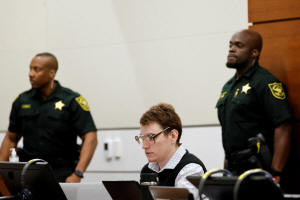Defense urges Florida jury to spare life of Parkland school shooter
 Send a link to a friend
Send a link to a friend
 [August 23, 2022]
By Julia Harte and Brian Ellsworth [August 23, 2022]
By Julia Harte and Brian Ellsworth
(Reuters) -A defense attorney on Monday
implored a Florida jury to spare the life of Nikolas Cruz, who killed 17
people in a 2018 high school mass shooting in the city of Parkland,
citing brain damage linked to fetal drug and alcohol exposure as reason
not to impose the death penalty.
Cruz, 23, pleaded guilty last October to committing premeditated murder
at Marjory Stoneman Douglas High School in Parkland, about 30 miles (50
km) north of Fort Lauderdale, in one of the deadliest school shootings
in U.S. history. Cruz killed 14 students and three staff members.
Melisa McNeil, Cruz's lead public defender, told the 12 Broward County
jurors that he should receive life in prison without parole due to
mitigating factors including lifelong developmental delays and
mental-health disorders that arose from his biological mother's drug and
alcohol abuse during pregnancy.
"Because of that, his brain was irretrievably broken, through no fault
of his own," McNeil told the jury.

Among the witnesses McNeil called after making her opening statement was
Cruz's half-sister, Danielle Woodard, who tearfully testified that their
mother drank heavily and used drugs including cocaine while she was
pregnant with Cruz.
Jurors must decide whether to sentence him to death or to life in prison
without possibility of parole.
Prosecutor Michael Satz told jurors in July that Cruz, a 19-year-old
expelled student at the time of the shootings, should be put to death
for "goal-directed, planned, systematic murder - mass murder - of 14
students, an athletic director, a teacher and a coach."
[to top of second column]
|

Marjory Stoneman Douglas High School
shooter Nikolas Cruz looks on as his biological sister, Danielle
Woodard, testifies during the penalty phase of his trial at the
Broward County Courthouse in Fort Lauderdale, Florida, U.S., August
22, 2022. Amy Beth Bennett/South Florida Sun Sentinel/Pool via
REUTERS

McNeil on Monday acknowledged the horror of Cruz's crime but
reminded the jurors that they were under no obligation to vote for
death even "in the worst case imaginable. And it is arguable that
this is the worst case imaginable."
Under Florida law, a jury must be unanimous in its decision to
recommend that a judge sentence Cruz to be executed.
Cruz said when he pleaded guilty that he was "very sorry" and asked
to be given a chance to help others.
The start last month of the trial's penalty phase included testimony
from students who were at school that day and cellphone videos in
which terrified students cried for help or spoke in hushed whispers
as they hid.
U.S. gun violence gained renewed attention following recent mass
shootings. These include one in July at an Independence Day parade
outside Chicago that killed seven people, one in May at a school in
Uvalde, Texas, that left 19 children and two teachers dead, and one
in May at a supermarket in a predominately Black neighborhood of
Buffalo, New York, that killed 10 people.
President Joe Biden in June signed the first major federal gun
reform legislation in three decades, which he called a rare
bipartisan achievement.
(Reporting by Brian Ellsworth and Julia Harte; editing by Will
Dunham, Donna Bryson and Jonathan Oatis)
[© 2022 Thomson Reuters. All rights
reserved.]
This material may not be published,
broadcast, rewritten or redistributed.
Thompson Reuters is solely responsible for this content. |